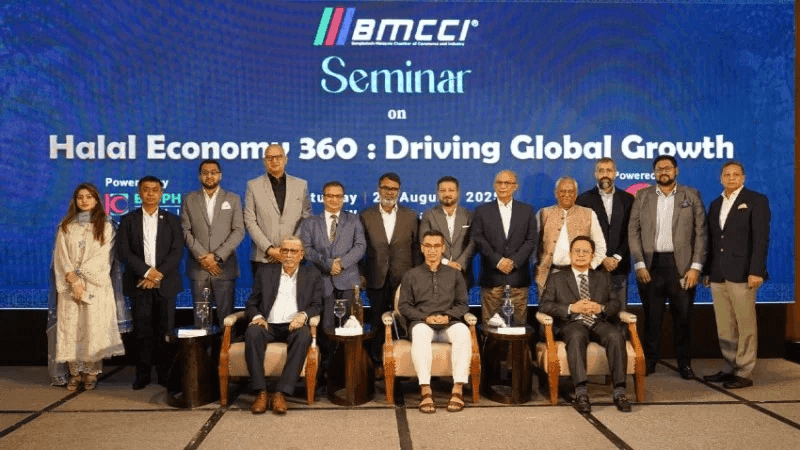Bangladesh is positioning itself to become a regional hub for halal products, as the country’s interim government intensifies efforts to build a robust ecosystem to support the expanding halal economy.
Speaking at a high-level seminar titled “Halal Economy 360: Driving Global Growth” on Saturday, Chowdhury Ashik Mahmud Bin Harun, Executive Chairman of both the Bangladesh Investment Development Authority (BIDA) and the Bangladesh Economic Zones Authority (BEZA), said Bangladesh must seize the opportunity to claim a greater share of the $7 trillion global halal market.
Organised by the Bangladesh-Malaysia Chamber of Commerce and Industry (BMCCI), the event drew participation from key local and international stakeholders. The High Commissioner of Malaysia to Bangladesh, Mohd Shuhada Othman, reaffirmed Malaysia’s willingness to share expertise in halal certification, trade facilitation, and policy development areas where Malaysia is considered a global leader.

“This collaboration can yield substantial benefits for both nations,” Othman said, pointing to the halal economy as a vital driver of inclusive growth. In FY2023–24, Malaysia exported goods worth $2.6 billion to Bangladesh, while Bangladeshi exports to Malaysia stood at only $293.5 million.
BMCCI sees the halal sector as a potential game-changer in balancing bilateral trade. BMCCI President Shabbir A Khan projected that with streamlined certification and policy reforms, Bangladesh could reach $7–8 billion in halal exports to Malaysia alone by 2030.
Highlighting the global dynamics, Ashik noted that a significant share of halal-certified products is produced in non-Muslim-majority countries. “This is unfortunate, but it also presents a strategic opportunity for Bangladesh to step in as a trusted halal manufacturing base,” he said.
To that end, the government is working to attract both local and foreign investment in halal industries through infrastructure development in special economic zones, easing of halal certification procedures, and export facilitation.
A keynote presentation by Dr Mominul Islam of IUBAT provided a roadmap for Bangladesh’s halal industry, forecasting that the global halal food market will grow from $3.3 trillion in 2025 to $9.45 trillion by 2034, with an annual compound growth rate of 12.42%.
Industry veteran Syed Alamgir, chairing a working session, emphasized the importance of strong certification frameworks, better consumer targeting, and wider market access to gain global competitiveness.
Panelists, including BMCCI Secretary General Md Motaher Hoshan Khan, called for proactive policies, investment incentives, and aggressive branding strategies to unlock the sector’s full potential.
The seminar concluded on an optimistic note, with stakeholders agreeing that Bangladesh’s emergence as a halal economy leader is within reach if the country moves swiftly with coordinated actions across government, industry, and academia.
BOB Post

